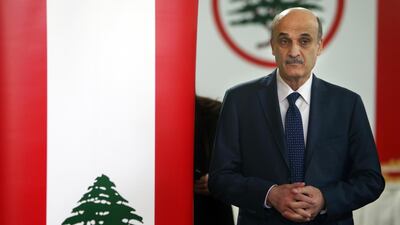Two Lebanese Christians politicians have said in forthright terms that their community took the brunt of the destruction after the Beirut port explosion last week, raising sectarian stakes amid the upheaval engulfing the country.
Although Lebanon has been deeply divided since the establishment of the Second Republic in 1990, politicians rarely used naked references to their religion, after violence engulfed most the country’s 18 officially recognised sects in the civil war.
But the two politicians, Samir Geagea and Nadim Gemayel, directly referred in the last few days to Christian East Beirut as having taken most of the damage from the explosion at the port.
The explosion of 2,750 tonnes of ammonium nitrate on Tuesday killed 158 people and wounded 6,000. It occurred amid disintegration of the Hezbollah-aligned government and the collapse of the country.
Mr Geagea, head of the Lebanese Forces Movement and one of Hezbollah’s fiercest critics, on Saturday termed the port disaster as the “Achrafieh explosion”, after a Christian district where damage was among the heaviest.
Nadim Gemayel, one of at least six members of parliament who resigned in protest at the government’s failures, said “the explosion caused the biggest pain among the Christians.”
“The pain we are feeling is Christian first, Beiruti second and finally Lebanese,” he said on television.
Although Mr Gemayel expected the whole of Lebanon to show solidarity with the victims, he emphasised that the Christian districts were hardest hit.
Pro-Hezbollah politicians have been subdued, amid cabinet resignations that could bring down the most pro-Hezbollah administration since the end of the civil war.
Hezbollah leader Hassan Nasrallah said that he “looks positively” at a visit by French President Emmanuel Macron last week. In Beirut for a day, Mr. Macron floated a vague political initiative for Lebanon to qualify for long-term aid.
The pro-Hezbollah Al Mayadeen Television criticised Mr Macron for meeting people in the Christian district of Gemayzeh, which is adjacent to the explosion site.
Al Mayadeen indicated that Mr Macron should have gone to Shiite districts, although the Shiite areas sustained far less damage.
Youssef Bazzi, a veteran Lebanese political commentator told The National that politicians trying to capitalise on sectarian sentiment after the explosion are unlikely to gain much.
Mr Bazzi pointed to Mr Geagea receiving a hostile reception when he visited Achrafieh after the explosion to show his solidarity with his coreligionists.
“No Christian politician can show his face on the streets, whether he is pro- or anti-government, because they are seen as having contributed to the nadir Lebanon has reached,” he said.
Mr Bazzi said Hezbollah has no interest in escalation, because French proposals are unlikely to significantly challenge its dominance over the state, and its status as the only officially-sanctioned armed group in Lebanon.
“Hezbollah is lying low,” Mr Bazzi said. “Playing the sectarian card would bring it little advantage now.”














